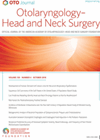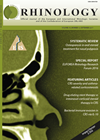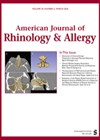
Journal Reviews
Artificial intelligence and OSA
The future’s bright, the future’s Orange AI… If you Google ‘how much is AI worth?’, the AI overview tells you “The global artificial intelligence (AI) market size is estimated at approximately $244 billion to $391 billion in 2025 and is...
Is there any point giving postoperative oral steroids after a FESS?
It is well accepted that when medical treatment fails for chronic rhinosinusitis (CRS), endoscopic sinus surgery (ESS) is more effective than continuing with medical therapy alone. A variety of postoperative care options are available, including saline irrigation, in office debridement,...
An otological cure for globus?
Globus pharyngeus is a common benign condition frequently encountered in ENT practice. Laryngopharyngeal reflux and psychological stressors are often considered to be contributory factors, but globus symptoms do not always respond to antacid medications. Such medications can also be limited...
A study defining septal areas and turbinates that are relevant in assessing patients with nasal obstruction
The symptom of nasal obstruction is subjective when patients present in clinics. The decision to intervene surgically is often made on clinical appearance of the nasal septum and turbinates which, unless extreme, cannot always be judged as different from patients...
Early recognition aiding better prognosis?
As we are all aware, acute invasive fungal rhinosinusitis (AIFR) is a life-threatening disease which typically affects immunocompromised patients. It is diagnosed via typical signs, symptoms and presentation but gold standard is by biopsy of tissues demonstrating infiltration fungal hyphae....
How safe is ESS really?
Endoscopic sinus surgery (ESS) is a very frequently performed operation, both in America and worldwide. This ambitious project looked at the health data of more than 105 million patients across 60 1US HCOS. The cohort of 116,669 patients who underwent...
Office treatment for persistent rhinorrhoea
Vasomotor rhinitis (VR) is a common condition across the world. Patients suffering from VR commonly have symptoms of persistent bilateral rhinorrhoea, that can have a significant negative impact on their quality of life. Vasomotor rhinitis can be treated medically with...
Globus, reflux or perhaps both?
We rarely do an ENT clinic without encountering a patient with persistent or recurring feeling of a lump or foreign body in the throat. We are also familiar with patients dreading to hear the C word after the endoscopic examination...
Adult Rhinosinusitis Clinical Practice Guideline update
This is a summary of the ‘Clinical Practice Guideline: Adult Sinusitis’ from the American Academy of Otolaryngology-Head and Neck Surgery Foundation. This is an update of the 2015 version. Evidenc-based statements: 1a. Differential diagnosis of acute rhinosinusitis: Clinicians should distinguish...
Eosinophilic complications during dupilumab therapy
Dupilumab is a humanised monoclonal antibody that targets type 2 inflammation by blocking IL-4 and IL-13 signalling. Reported adverse events from its use include injection site erythema, conjunctivitis, arthralgia and hypereosinophilia. The potential for more severe eosinophilic-related complications such as...
Not the answer yet, but it may be in the future
AI is certainly a topical issue these days and radiomics refers to techniques which allow the extraction of quantitative features from medical imaging to produce large data sets for clinical problem solving. This paper looks at CT imaging of the...
Budesonide nasal irrigation for chronic rhinosinusitis: is it effective and safe?
Budesonide respules used in nasal irrigations as part of chronic rhinosinusitis management are usually at a dose of 0.25 mg to 2 mg, which is substantially higher compared to budesonide nasal spray, typically ranging from 64 to 256 micrograms. Hence,...















